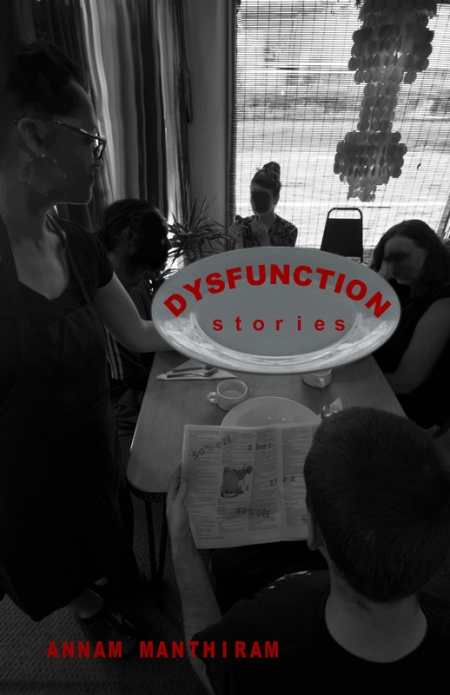
Dysfunction: Stories
The promotional copy for the short story collection Dysfunction describes the book as “dramatically different in style and form,” and the marketing doesn’t lie. In fact, one could add to that: unusual, disturbing, unapologetically in-your-face. Annam Manthiram has crafted characters and situations that are charged, contemporary, and sometimes cruel; they make their way, often clumsily and without compunction, through situations drunk with the impossibility of enmeshing Indian cultural ideas and customs against an American landscape.
The book could not have been more aptly titled: Dysfunction is the connecting thread between and within each story, and Manthiram deals with dysfunction the way a pornographic film director does full frontal nudity—no soft lighting or oblique camera angles. And yet, unlike that kind of film, in these stories, there’s often something to admire, such as a complex, vulnerable striver, and something to learn about humans—and inhumanity.
This book is not for readers who like their short fiction uplifting, but rather for pragmatists interested in the intricacies of human frailty, the art of an unblinkingly unhappy plot, and the depth of dysfunction across families, friends, and foes.
In “The Reincarnation of Chamunda,” the author writes in the voice of an older woman still undergoing the emotionally painful ritual of bride viewing: “Awareness of my own mortality made life more manageable. I related it to chaos theory—over time, all things lead to disorder. The same could be applied to life: the way our skin degraded, how our lives became less tolerable and our spouses more violent.”
A few stories are experimental, such as “Variations on a Blossoming Marriage,” in which the narrator chronicles her failed relationships alphabetically, each titled with the name of a flower, but offering mocking scorn instead of lovely metaphorical images. One of the most arresting and disturbing is one of the shorter stories, “Pro Choice,” but when the author stretches out, such as in the much longer “Asha Ma” and “When You Were Young,” the narrative energy is potent.
“Dysfunction” is precisely defined as the abnormal or impaired functioning of systems or organs. In as much as families, friendships, and workmates are bodies of humanity, this collection shows them in all their ugly impairment, even as some reach for decency. Readers should know from the start that there will be sadness in the pages ahead, but there also will be some functional victories.
Reviewed by
Lisa Romeo
Disclosure: This article is not an endorsement, but a review. The publisher of this book provided free copies of the book to have their book reviewed by a professional reviewer. No fee was paid by the publisher for this review. Foreword Reviews only recommends books that we love. Foreword Magazine, Inc. is disclosing this in accordance with the Federal Trade Commission’s 16 CFR, Part 255.
